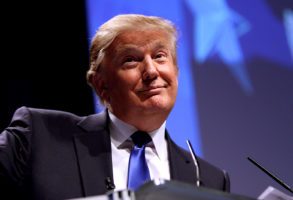
Published December 18, 2016
The Trump era will be unpredictable in many ways. But there’s one thing that we can reasonably count on. Moderation, an ancient virtue, will be viewed with contempt. After all, the most temperamentally immoderate major party nominee in American history ran for president and won because of it. Victory spawns imitation, and the Trump template is likely to influence our politics for some time to come.
Moderation, then, is out of step with the times, which are characterized by populist anger and widespread anxiety, by cross-partisan animosity and dogmatic certainty. Those with whom we have political disagreements are not only wrong; they are often judged to be evil and irredeemable.
In such a poisonous political culture, when moderation is precisely the treatment we need to cleanse America’s civic toxins, it invariably becomes synonymous with weakness, lack of conviction and timidity. For many, moderation is what the French existentialist Jean-Paul Sartre called a “tender souls philosophy.”
This is quite a serious problem, as Aurelian Craiutu argues in his superb and timely new book, “Faces of Moderation: The Art of Balance in an Age of Extremes,” in which he profiles several prominent 20th-century thinkers, including Raymond Aron, Isaiah Berlin and Michael Oakeshott. Mr. Craiutu, a professor of political science at Indiana University, argues that the success of representative government and its institutions depends on moderation because these cannot properly function without compromise, which is the governing manifestation of moderation.
The case for political moderation requires untangling some misconceptions.
Moderation does not mean truth is always found equidistant between two extreme positions, nor does it mean that bold and at times even radical steps are not necessary to advance moral ends. Moderation takes into account what is needed at any given moment; it allows circumstances to determine action in the way that weather patterns dictate which route a ship will follow.
But there are general characteristics we associate with moderation, including prudence, the humility to recognize limits (including our own), the willingness to balance competing principles and an aversion to fanaticism. Moderation accepts the complexity of life in this world and distrusts utopian visions and simple solutions. The way to think about moderation is as a disposition, not as an ideology. Its antithesis is not conviction but intemperance.
Moderates “do not see the world in Manichaean terms that divide it into forces of good (or light) and agents of evil (or darkness),” according to Professor Craiutu. “They refuse the posture of prophets, champion sobriety in political thinking and action, and endorse an ethics of responsibility as opposed to an ethics of absolute ends.” This allows authentic moderates to remain open to facts that challenge their assumptions and makes them more likely to engage in debate free of invective. The survival of a functioning parliamentary system, Sir William Harcourt said, depends on “constant dining with the opposition.”
The charge that moderates lack courage is easily put to rest by people like the French journalist and philosopher Raymond Aron. He was a man of deep, reasoned convictions who possessed a sense of proportion. A nonconformist, Aron was fearless in taking on the leading intellectuals of his time, including his friend Sartre. (Parisian students in 1968 avowed that it was “better to be wrong with Sartre than right with Aron.”) Aron strongly defended liberal democracy when it was fashionable to denigrate it. Playing off the Marxist claim that religion was the opium of the masses, Aron argued that Marxism was the opium of the intellectuals.
For Aron, political moderation was a fighting creed. Allergic to ideological thinking, he conformed his views to evidence. He retained his intellectual and political independence throughout his life. Aron believed that history teaches us humility, modesty and the limits of our knowledge. He was also skilled at the art of dialogue, engaging those he disagreed with critically but civilly. “As the last great representative of a distinguished tradition of European liberalism,” Professor Craiutu writes, “Aron attempted to disintoxicate minds and calm fanaticism in dark times.” Aron put it this way: “Freedom flourishes in temperate zones; it does not survive the burning faith of prophets and crowds.”
The concern some of us have is that even before Mr. Trump set foot on the political stage, America was becoming a bit more like the Sahara or the Arctic Circle than a temperate zone; that moderation was passé in both parties and that no politician would defend it as a political virtue. Add to this an incoming president who appears to be “passion’s slave,” who has developed few if any habits of restraint and, if he governs as he campaigned, will summon forth and amplify the darkest impulses in our nation.
The business of a government, Oakeshott said, is “not to inflame passion and give it new objects to feed upon, but to inject into the activities of already too passionate men an ingredient of moderation.”
Mr. Trump deserves the chance to prove his critics wrong. If he doesn’t — if what he has shown himself to be is what he continues to be — then rather than injecting an ingredient of moderation into the activities of Americans, he will inflame their passions and give them new objects to feed upon.
Moderation is a difficult virtue for people to rally around, since by definition it doesn’t arouse fervor or zealous advocates. But in a time of spreading resentments and rage, when truth is increasingly the target of assault and dialogue is often viewed as betrayal, moderation isn’t simply a decorous democratic quality; it becomes an essential democratic virtue.
In this immoderate age, moderation must become America’s fighting faith.
Peter Wehner, a senior fellow at the Ethics and Public Policy Center, served in the last three Republican administrations and is a contributing opinion writer.








